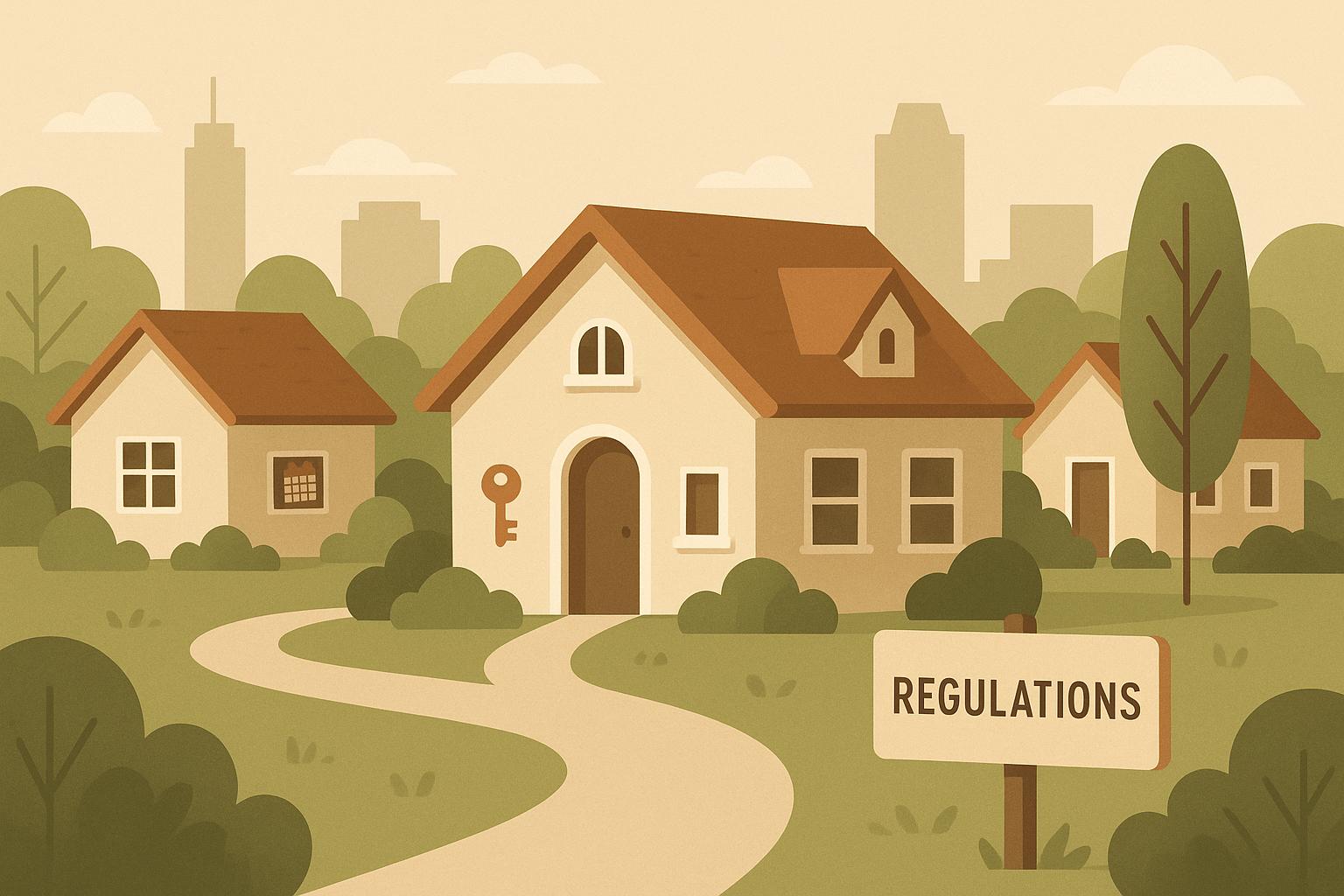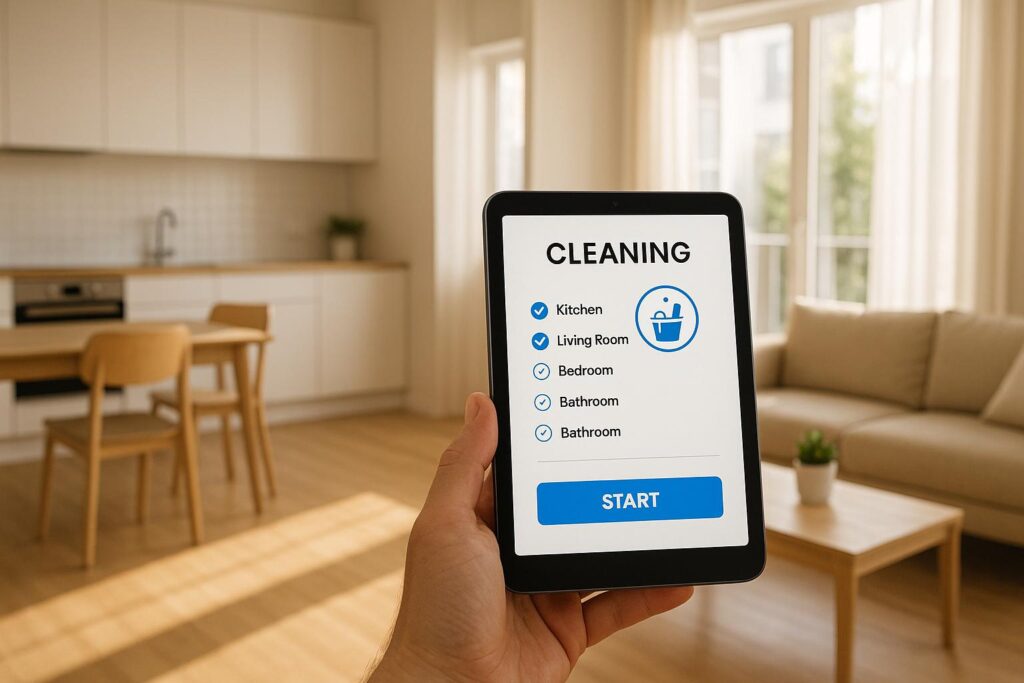Avoid hefty fines for your short-term rental in Austin by following these key rules:
- License Required: You must have a valid short-term rental (STR) license to operate legally.
- Guest Limits: Stick to occupancy and noise rules to avoid penalties.
- Pay Taxes: Collect and submit local and state occupancy taxes on time.
- Handle Complaints: Address neighbor concerns promptly to prevent inspections or fines.
- Stay Updated: Follow the latest 2023-2025 rule updates for compliance.
Violations like operating without a license, exceeding guest limits, or failing to pay taxes can lead to escalating fines, suspension, or even license revocation. Keep your records organized, ensure safety compliance, and maintain good communication with neighbors to avoid issues.
For help navigating Austin’s STR rules, consider working with a property management expert like Austin Local Team.
City of Austin proposes overhaul to short-term rental regulations
Austin’s Short-Term Rental Laws
Austin has established a licensing and compliance system for short-term rentals (STRs) to maintain public safety and uphold community standards.
2023-2025 Rule Updates
Between 2023 and 2025, new updates were introduced to improve transparency and accountability. These changes aim to balance rental opportunities with maintaining the quality of life in neighborhoods. Property owners should always review the latest official guidelines to stay informed about current requirements.
License Requirements
To legally operate an STR in Austin, you must obtain a license that confirms your property meets safety and operational standards. The application process requires the following:
- Proof of property ownership or a valid lease
- Insurance information
- Government-issued identification
- Documentation showing awareness of tax and safety protocols
Licensed owners are responsible for keeping permits up to date, scheduling regular safety inspections, and providing accurate contact information.
For those needing assistance, Austin Local Team offers property management services to help navigate these requirements. Their local knowledge ensures compliance while helping you make the most of your rental property within the law.
Next, we’ll cover common violations and the fines associated with them to help you avoid unnecessary penalties.
Top Rental Violations and Fines
Understanding common rental violations can help property owners steer clear of hefty fines and legal troubles.
Operating Without a License
Listing a short-term rental without the required license can lead to daily penalties. Property owners must secure the necessary licensing before offering their property for rent. Audits often uncover unlicensed rentals, which can result in significant fines.
Guest Limits and Noise Rules
Short-term rentals must adhere to occupancy limits, noise regulations, and quiet hours set by local authorities. Ignoring these rules can lead to increasing fines for repeated violations.
Tax Collection Rules
Rental operators are required to collect and remit both local and state taxes. Failing to comply can result in back taxes, added interest, and administrative fees.
Location and Neighbor Complaints
Ignoring location requirements or failing to address neighbor complaints can lead to inspections and additional penalties. Keeping detailed records of rental activities and guest interactions can help demonstrate compliance.
sbb-itb-4c99469
Fine Amounts and Penalties
Austin imposes increasing fines for short-term rental violations, depending on the type of infraction and how often it occurs.
Fine Schedule by Violation
The city penalizes violations such as operating without a license, exceeding occupancy limits, noise disturbances, failing to report taxes, or posting unauthorized advertisements. Initial fines are lower but rise with repeated offenses. To get the most accurate and up-to-date information, contact the City of Austin Code Department. Repeated violations can lead to harsher penalties, as detailed below.
Multiple Violation Penalties
For recurring or ongoing violations, the city enforces stricter measures. Property owners could face:
- Accumulating fines for repeated offenses
- Temporary suspension of rental privileges
- Permanent license revocation in severe cases
- Requirements for inspections and compliance training
Keeping organized records of rental activities can help property owners minimize risks and stay compliant with city regulations.
Steps to Follow Rules and Avoid Fines
Here’s how you can stay compliant with Austin’s short-term rental regulations and avoid penalties.
Compliance Checklist
Documentation and Licensing
- Maintain a valid short-term rental license.
- Keep records of guest occupancy to ensure you stay within the allowed limits.
Guest Management
- Clearly display house rules, including noise restrictions.
- Ensure guest occupancy stays within permitted limits.
- Set up clear communication channels with neighbors to quickly address any concerns.
Financial Compliance
- Use a system to collect and remit hotel occupancy taxes.
- Keep detailed records of rental income and taxes.
By sticking to this checklist, you can reduce the risk of fines and keep your rental operations running smoothly.
Austin Local Team Support
Need extra help? The Austin Local Team offers expert guidance to make compliance easier.
Expert Matching Services
The team connects property owners with experienced real estate professionals who are well-versed in local short-term rental rules. They can:
- Assess your property’s compliance status.
- Suggest necessary updates or improvements.
- Assist with the licensing process.
- Help you set up proper tax collection systems.
Property Management Solutions
Through their network, Austin Local Team also supports property owners with:
- Setting up booking systems.
- Implementing guest screening processes.
- Creating clear house rules.
- Developing neighbor communication protocols.
Summary
Following Austin’s short-term rental rules is crucial for running a smooth and profitable operation. These regulations require proper licensing, accurate records, and compliance with guest and tax guidelines to avoid hefty fines.
Here are the key points to keep in mind about Austin’s short-term rental rules:
- Display a valid short-term rental license at all times
- Collect and submit hotel occupancy taxes on schedule
- Adhere to guest limits and noise rules
- Respond promptly to any neighbor complaints
The real estate experts at Austin Local Team can assist with licensing, tax processes, and property management. Their guidance helps ensure you stay compliant while safeguarding your investment.
Keep your compliance practices up-to-date to maintain long-term success.
FAQs
What steps do I need to follow to get a short-term rental license in Austin?
Obtaining a short-term rental license in Austin involves several steps to ensure compliance with local regulations. While specific details may vary, the general process typically includes:
- Determine your property type: Identify whether your property is a Type 1 (owner-occupied), Type 2 (non-owner-occupied but single-family), or Type 3 (multi-family) rental. This classification affects the application requirements.
- Submit an application: Complete the City of Austin‘s short-term rental application form and provide required documentation, such as proof of ownership, a certificate of occupancy, and a site plan.
- Pay the application fee: Fees vary depending on the rental type and are typically paid in U.S. dollars.
- Pass inspections: Your property may need to pass health and safety inspections to ensure it meets city standards.
- Receive your license: Once approved, you’ll receive your license, which must be renewed annually.
For the most accurate and updated information, refer to the City of Austin’s official guidelines. If you’re exploring real estate opportunities in Austin, Austin Local Team can connect you with top local agents to help navigate the market with ease.
What can property owners do to address neighbor complaints and avoid fines for short-term rental violations in Austin?
To address neighbor complaints and reduce the risk of fines for short-term rental violations in Austin, property owners should take proactive steps to maintain good relationships and comply with local regulations. Clear communication is key – provide neighbors with your contact information and encourage them to reach out directly if issues arise. This approach can help resolve minor concerns before they escalate.
Additionally, ensure your property complies with Austin’s short-term rental rules, such as noise limits, parking requirements, and occupancy restrictions. Regularly remind guests of these rules through house manuals or welcome notes to prevent potential violations. By being responsive and diligent, property owners can foster positive neighbor relations and minimize the likelihood of inspections or penalties.
What happens if I don’t pay occupancy taxes on time for my short-term rental in Austin?
Failing to pay occupancy taxes on time for your short-term rental in Austin can lead to penalties and fines. The City of Austin typically imposes late fees, which may include a percentage of the unpaid taxes or a flat fine. Continued non-payment could result in additional enforcement actions, such as legal proceedings or the suspension of your short-term rental license.
To avoid these consequences, ensure you file and pay your occupancy taxes by the required deadlines. If you’re unsure about the process, consider consulting a professional or reaching out to a local expert for guidance.






